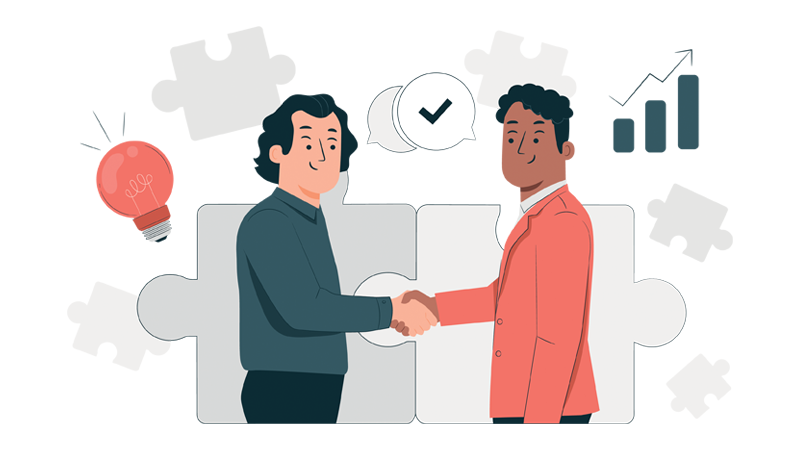When making a sale, it is important to be mindful of all the individuals and departments who have a say in whether or not the deal closes. Each of these individuals at the target company has their own agenda and interests, and thus must be approached differently when trying to persuade them. The four buyer roles we will be discussing today are the champion, the influencer, the economic buyer, and the technical buyer. Some of these roles have the capacity to overlap, and strategies that work with one role may also help another. The key is to focus on what each role needs from you and what it can accomplish for you.
Related: How Can You Influence the Buyer Journey?
The Champion
The first buyer role we are going to look at is the champion, also known as the “coach” or “sponsor.” This individual is usually someone who is inside the target company and acts as an advocate and informant for your business. Occasionally, the champion may be an outsider, but they still have some sort of consulting role for your target company.

Influencing the champion is vital because they are going to be your number one advocate and a foot in the door, selling your product or service to the people you cannot yet reach. This person can have any number of other roles within the buying organization, but they are defined by their ability to sponsor your cause to their coworkers and get you in touch with the decision-makers. If the champion is also a decision maker, great, you are one step ahead of the game. Occasionally, champions can be an executive or a financial influencers, which makes it easier for you to close a deal if your biggest advocate is also the one calling the shots.
Some things to consider are the roles that your champion will play in the buyer organization and what type of information they can deliver, as these insights can help you plan out the buying cycle and future interactions with the buyer company.
#1 Listen to your champion
Everyone likes to feel heard, and your champion is no different. A good champion will be your eye on the inside, informing you about why your target company is looking to buy your service. The champion will also give you access to other buying influencers such as the technical buyer and the financial buyer. Furthermore, the champion will coach you on how to win over each buyer, outlining what benefits they are looking for and how to secure their vote. (This is why the champion is sometimes referred to as the coach.) By listening to the champion, you not only gain invaluable insight into your target company, but you also make them feel heard and more likely to advocate for you within their organization.
#2 Good marketing, good sales
Be sure to provide your champion with quality marketing material and up-to-date information so that whatever they are pitching to their superiors is accurate. You want to set your champion up for success by giving them access to as much internal promotion material as possible.
#3 Be personable
Your champion is putting their reputation at their company on the line for you, so make sure you are the type of person they want to represent. Give them as many tools as you can to help them succeed at helping you succeed.
By using these tactics, you can encourage the champion to advocate for your product, giving you easy access to a network of contacts within the target company. Just be sure not to forget about your champion once you have contact with the other buyer roles. Their assistance can prove invaluable in swaying these other buyers. Even after the deal is closed, the champion may continue to advocate for your product, encouraging your client to buy more services or raise their budget for existing services.
The Influencer
The influencer is the person or group that will be using your product or service the most, and so they play a major role in how the other buyers at your target company will decide. Your product will make a direct impact on the influencer or the influencer’s department, so they will be supervising how your product is used day-to-day and evaluating any patterns that emerge alongside your service.
The influencer’s close proximity to your service means that this is one of the first people you need in your corner in order to make the sale. Getting close to the executive in charge of this department will increase your odds of closing the deal. This person or group should be one of your main contacts in the company so that you can provide them with consistent information and proof that your product will improve their job performance and quality of life.
#4 Nurture your relationship
You can use marketing material and social media to create a personalized relationship with this buyer role. Since they are the ones who will be using your product the most, creating a positive relationship where you can show them the benefits of your product will go a long way. Sometimes your champion can even come from the influencer’s department.
#5 Understand the problem
A major tool in your arsenal when dealing with influencers is to keep in mind their pain points. Focus on the specific needs of your buyer, and be sure to ask questions. By asking pain-based questions to the influencer, you can ensure that your product is the solution to their problems. Even a small solution can cause big waves if it is used on a daily basis.
#6 Offer the solution… temporarily
Free trials and demonstrations can sometimes be the lifeblood of securing a sale, or at the very least, a vote from the influencer. Since these individuals are working hands-on with your solution, they will be the ones saying if it is something they will actually use. By giving a demonstration or free trial, you have an opportunity to show them exactly how your product would work in their organization and the quality of life improvements that come with it. This tactic allows you to prove that your product is invaluable.
Although the influencer does not have the final say on the sale, their opinion is important because they are the ones directly using the product, and will be a strong advocate when communicating with the economic buyer. If you are able to successfully sell to the influencer, then they will give the green light to the economic buyer.
The Economic Buyer

The economic buyer is the final decision maker. They have the authority to commit funds for the purchase of your product. Usually, the economic buyer comes in the form of an executive committee or a board of directors, often swayed by the words of the champion and the influencer.
#7 Think about the future
Usually, the economic buyer is not directly impacted by the product or services they allocate money to, but they do have to be mindful of how your product impacts the organization as a whole. While the immediate results of your service are important, knowing how your product can benefit a company over time will help an economic buyer feel better about making a large financial commitment.
#8 Focus on ROI
Particularly, the economic buyer will focus on the ROI (Return on Investment) and how much money your service will net them. If the economic buyer feels that your solution will cost more than it will earn, then they may pull the plug on the sales process. For these reasons, it is important to engage the economic influencer throughout the sales process, since they have the most persuasion power
One would think that the economic buyer would focus solely on price, but you should avoid making this the highlight of your negotiation. Instead, focus on the value of your service and the benefits for your buyer. A high return on investment will ensure that no matter your price, the benefits will be worthwhile for the right customer.
#9 Keep them informed
On the topic of ROI, letting the decision makers know how your product will impact their employees’ day-to-day function is crucial in negotiating. Sometimes numbers cannot fully quantify the impact a service has on a company, so in addition to showing the buyer how your product can earn or save them money, showcase how it will save their employees time and energy.
The Technical Buyer
The final buyer role we are going to look at is the technical buyer, also known as the ratifier or gatekeeper. The technical buyer’s role is to address specific questions and concerns about your product and act as a filter for bad proposals. The technical buyer develops specifications for a proposal and certain standards that must be met in order to approve a sale.

The technical buyer can come in many different forms, from legal teams to the IT department to HR. Regardless of their purpose within the organization itself, their role as a buyer is to ensure that your product complies with their business requirements and advise their organization’s decision makers accordingly.
Similar to financial buyers, technical buyers are usually not the ones being impacted by a sale, but they need to be aware of how that sale impacts the business as a whole. As a result, technical buyers have veto power over proposals that they believe do not meet their specifications. This makes them an important player, but they are also the hardest buyer role to build a relationship with since they have no personal interest in the product and will only be involved in the buying process for a short period of time. For this reason, you should capitalize on any time you get with the technical buyer, since you may only get one chance to make an impression of your own. After that, you will have to rely solely on the champion to interact with the technical buyer, but there are still steps you can take to influence the technical buyer’s decision.
#10 Meet their requirements
In order to make your product enticing for the technical buyer, ensure that your proposal meets all their requirements and creates as little paperwork for the buyer as possible. You want to ensure that your solution is feasible within their current system and easy to execute.
#11 Make their job easier
Additionally, you need to make sure the technical buyer knows that purchasing your service or product would be more efficient than trying to create your product themselves.
#12 Dedicate time, but not too much time
Remember, they cannot say yes, but their “no” vote is influential, so you do not need to convince them to buy, only that your offer is too enticing to decline. Spend enough time with these buyers to get them on your side, but do not worry about selling to them. Once they are not a threat of vetoing your proposal, focus your attention on the buyers who have the power to say yes.
In Conclusion
Knowing your buyer is half of the battle in closing a deal. Although the roles have distinct interests within their organization, they all work together to come to a purchasing decision and can influence each other. If you understand what they want and need then you can sway the different buyer roles to advocate for your product and ultimately vote “yes.”
The Article is originally published at Callbox - The Savvy Marketer



